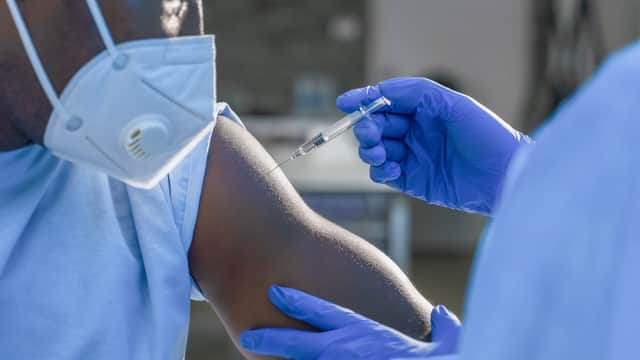This is how long it takes for a Covid vaccine to work - and how long it might last


The Oxford/AstraZeneca vaccine has been approved by the Medicines and Healthcare Regulatory Agency (MHRA), meaning millions of people in the UK will be able to be vaccinated.
Early in December, The Pfizer/BioNtech vaccine was approved, with vaccinations taking place across the UK, but how do the different vaccines currently being administered across the world work, and how long does it take for them to take effect?
How does the Oxford/AstraZeneca vaccine work?
Advertisement
Hide AdAdvertisement
Hide AdThe vaccine uses a weakened, harmless, version of a common virus which was found to be giving a cold to chimpanzees. The virus has been used previously to produce vaccines against the flu, Zika virus and Middle East respiratory syndrome (MERS).
The virus is genetically modified for it to be able to grow in humans, and scientists have transferred the genetic instructions for the coronavirus spike protein (which it needs to invade cells) to the vaccine.
On entrance into the human body, the vaccine enters cells and uses the genetic code to produce the surface spike protein of the coronavirus.
Inducing an immune response, the body has now primed the immune system to attack coronavirus if it infects the body.
How does the Pfizer/BioNtech vaccine work?
Advertisement
Hide AdAdvertisement
Hide AdThe double jabs from Pfizer and Moderna are messenger RNA (mRNA) vaccines.
An mRNA vaccine differs from conventional vaccines as it only uses the virus’s genetic code, instead of being produced using weakened forms of the virus.
The vaccine is injected into the body, entering the cells and instructing them to create antigens. The antigens are then recognised by the immune system, in order to prepare itself to fight against coronavirus.
Because no virus is needed to produce this vaccine, the production can be much quicker.
How does the Moderna vaccine work?
Advertisement
Hide AdAdvertisement
Hide AdThe Moderna vaccine is also an mRNA vaccine, meaning it doesn't contain any coronavirus and cannot cause infection.
The vaccine uses a piece of genetic code that trains the immune system to recognise the spike protein on the surface of the coronavirus, preparing it to attack the real thing if it arrives.
How does the Gamaleya (Sputnik V) vaccine work?
The Russian Gamaleya (Sputnik V) vaccine works in a similar way to the Oxford vaccine, with early results in November, suggesting it could be 92 per cent effective.
The vaccine uses a harmless virus that has been genetically modified to resemble the coronavirus. The vaccine would require two doses, but, unlike the Pfizer vaccine, it does not require low temperatures when stored.
What happens to your body when you get a coronavirus vaccine?
Advertisement
Hide AdAdvertisement
Hide AdCovid-19 vaccines are designed to teach your body how to fight and destabilise the coronavirus.
After injection, it takes time for your body to ‘read the instructions’ from the vaccine to build up a defense system. This system will then be able to effectively kick away the coronavirus, limiting your chances of infection.
This is not an overnight process, so technically you will not be immune immediately after vaccination.
How long does it take for a vaccine to work?
Generally the protection from the virus starts seven to 10 days after immunisation.
Advertisement
Hide AdAdvertisement
Hide AdThe Pfizer/BioNtech vaccine needs to be given in two doses, and immunity starts seven to ten days after the second dose.
One dose vaccines are thought to take about 29 days to prepare your body to build immunity against Covid-19.
How long does the vaccine last?
We do not know how long protection from the vaccine will last, and it may vary between different vaccines.
Vaccine developers are currently looking at ways to boost the effectiveness of a vaccine so that it provides longer immune protection than a natural infection with the coronavirus.